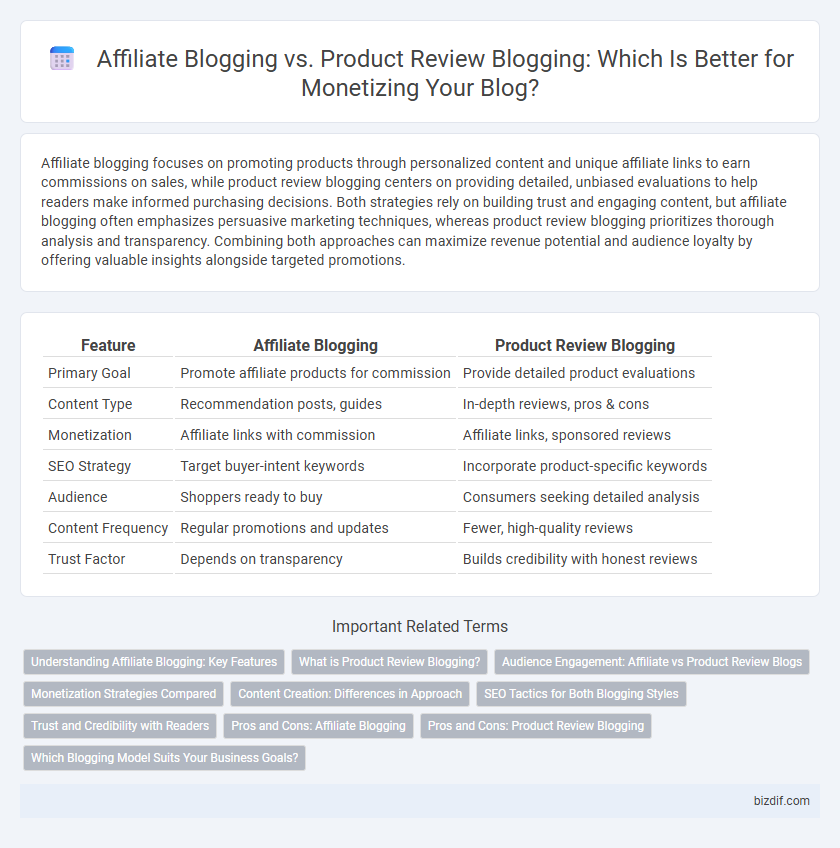Affiliate blogging focuses on promoting products through personalized content and unique affiliate links to earn commissions on sales, while product review blogging centers on providing detailed, unbiased evaluations to help readers make informed purchasing decisions. Both strategies rely on building trust and engaging content, but affiliate blogging often emphasizes persuasive marketing techniques, whereas product review blogging prioritizes thorough analysis and transparency. Combining both approaches can maximize revenue potential and audience loyalty by offering valuable insights alongside targeted promotions.
Table of Comparison
| Feature | Affiliate Blogging | Product Review Blogging |
|---|---|---|
| Primary Goal | Promote affiliate products for commission | Provide detailed product evaluations |
| Content Type | Recommendation posts, guides | In-depth reviews, pros & cons |
| Monetization | Affiliate links with commission | Affiliate links, sponsored reviews |
| SEO Strategy | Target buyer-intent keywords | Incorporate product-specific keywords |
| Audience | Shoppers ready to buy | Consumers seeking detailed analysis |
| Content Frequency | Regular promotions and updates | Fewer, high-quality reviews |
| Trust Factor | Depends on transparency | Builds credibility with honest reviews |
Understanding Affiliate Blogging: Key Features
Affiliate blogging centers on promoting third-party products or services through unique referral links, generating commissions on sales driven by the blog traffic. It emphasizes strategic content creation, SEO optimization, and audience trust to maximize click-through rates and conversions. Effective affiliate bloggers leverage analytics to track performance and refine their campaigns for sustainable revenue growth.
What is Product Review Blogging?
Product review blogging involves creating detailed evaluations of specific products, highlighting features, benefits, and drawbacks to inform potential buyers. This type of blogging often incorporates personal experiences, customer feedback, and comparative analysis to build trust and credibility. Product review blogs can drive targeted traffic and generate affiliate income by providing honest, in-depth insights that help readers make informed purchasing decisions.
Audience Engagement: Affiliate vs Product Review Blogs
Affiliate blogging drives audience engagement by presenting curated product selections that encourage clicks and conversions through personalized recommendations. Product review blogging fosters trust and deeper interaction by offering detailed, honest evaluations that help readers make informed buying decisions. Both models benefit from engaging content, but product review blogs often generate more sustained engagement through transparency and in-depth analysis.
Monetization Strategies Compared
Affiliate blogging primarily relies on earning commissions through referral links embedded within content, leveraging high-traffic niche topics to boost conversion rates. Product review blogging monetizes by providing detailed analyses and ratings that build trust, encouraging direct purchases or clicks on affiliate links, often complemented by sponsored posts. Both strategies benefit from SEO optimization and targeted content marketing to maximize affiliate revenue and partnership opportunities.
Content Creation: Differences in Approach
Affiliate blogging emphasizes creating content that subtly integrates product links within value-driven articles, aiming to guide readers toward making purchase decisions without overt sales pressure. Product review blogging focuses on in-depth, honest evaluations and comparisons of specific items, highlighting features, pros, and cons to help readers assess individual products. The difference lies in the content style: affiliate blogs blend promotional elements within broader topics, whereas product review blogs center primarily on comprehensive product analysis.
SEO Tactics for Both Blogging Styles
Affiliate blogging leverages targeted keyword research and strategic content placement to attract high-converting traffic, while product review blogging emphasizes detailed, unique product descriptions enriched with long-tail keywords to enhance search engine rankings. Both styles benefit from optimizing meta tags, implementing structured data for rich snippets, and building authoritative backlinks to improve domain authority and organic visibility. Consistent internal linking and user-engagement metrics also play crucial roles in boosting SEO performance for affiliate and product review blogs alike.
Trust and Credibility with Readers
Affiliate blogging builds trust by recommending products genuinely based on personal experience, fostering long-term relationships with readers. Product review blogging enhances credibility through detailed, unbiased evaluations supported by evidence and user feedback. Both strategies require transparency and expertise to maintain reader confidence and drive engagement effectively.
Pros and Cons: Affiliate Blogging
Affiliate blogging offers the advantage of generating passive income by promoting a wide range of products from different merchants, increasing monetization opportunities. However, it requires consistent traffic and SEO efforts to drive conversions and depends heavily on affiliate program terms and commission rates, which can fluctuate. The reliance on external platforms also poses risks such as account suspension or commission policy changes, potentially impacting revenue stability.
Pros and Cons: Product Review Blogging
Product review blogging offers the advantage of building trust through detailed, authentic evaluations that attract targeted audiences seeking specific product insights. However, it often requires extensive research and ongoing updates to maintain relevance and credibility in a competitive niche. Limitations include reliance on affiliate programs and potential bias perceptions, which can impact reader trust and conversion rates.
Which Blogging Model Suits Your Business Goals?
Affiliate blogging focuses on promoting third-party products to earn commissions, making it ideal for businesses aiming to generate passive income through diverse revenue streams. Product review blogging centers on creating in-depth, unbiased evaluations to build trust and authority, which suits brands prioritizing customer engagement and credibility. Choosing the right model depends on whether your primary goal is maximizing affiliate sales or establishing thought leadership in your niche.
Affiliate Blogging vs Product Review Blogging Infographic

 bizdif.com
bizdif.com